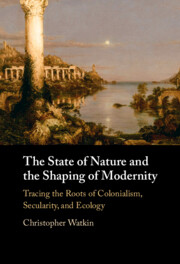Refine search
Actions for selected content:
82 results
Chapter 9 - Hume on Curiosity
-
-
- Book:
- Hume's <i>A Treatise of Human Nature</i>
- Published online:
- 05 December 2025
- Print publication:
- 08 January 2026, pp 152-169
-
- Chapter
- Export citation
2 - The Imaginary Worlds of the State of Nature
- from Part I - Making Sense of the State of Nature
-
- Book:
- The State of Nature and the Shaping of Modernity
- Published online:
- 19 November 2025
- Print publication:
- 18 December 2025, pp 75-120
-
- Chapter
- Export citation
Chapter 7 - Control and Protean Power in Small and Large Worlds
-
- Book:
- Entanglements in World Politics
- Published online:
- 27 November 2025
- Print publication:
- 11 December 2025, pp 272-308
-
- Chapter
-
- You have access
- Open access
- HTML
- Export citation

The State of Nature and the Shaping of Modernity
- Tracing the Roots of Colonialism, Secularity, and Ecology
-
- Published online:
- 19 November 2025
- Print publication:
- 18 December 2025
Chapter 2 - Thomas Hobbes, Born with Fear
-
- Book:
- The Social Contract
- Published online:
- 30 May 2025
- Print publication:
- 04 September 2025, pp 13-28
-
- Chapter
- Export citation
Chapter 2 - Leibniz
-
- Book:
- Freedom and Perfection
- Published online:
- 25 July 2025
- Print publication:
- 14 August 2025, pp 29-57
-
- Chapter
- Export citation
Chapter 1 - Thinking Freedom
-
- Book:
- Freedom and Perfection
- Published online:
- 25 July 2025
- Print publication:
- 14 August 2025, pp 1-28
-
- Chapter
- Export citation
Chapter 9 - States of Nature as Theories of Normativity
-
-
- Book:
- Kant's Lectures on Political Philosophy
- Published online:
- 18 July 2025
- Print publication:
- 07 August 2025, pp 161-178
-
- Chapter
- Export citation
Chapter 13 - Kant’s Retributive Turn
-
-
- Book:
- Kant's Lectures on Political Philosophy
- Published online:
- 18 July 2025
- Print publication:
- 07 August 2025, pp 238-255
-
- Chapter
- Export citation
Chapter 2 - The Many Ends of Natural Law
-
-
- Book:
- Kant's Lectures on Political Philosophy
- Published online:
- 18 July 2025
- Print publication:
- 07 August 2025, pp 28-47
-
- Chapter
- Export citation
12 - Sovereignty
- from Part II - Modalities
-
-
- Book:
- The Cambridge Handbook of Constitutional Theory
- Published online:
- 27 March 2025
- Print publication:
- 24 April 2025, pp 192-207
-
- Chapter
- Export citation
30 - The State
- from Part III. A - The State
-
-
- Book:
- The Cambridge Handbook of Constitutional Theory
- Published online:
- 27 March 2025
- Print publication:
- 24 April 2025, pp 523-536
-
- Chapter
- Export citation
7 - The New View and its Provenance
- from Part IV - A New View of Liberty
-
- Book:
- Liberty as Independence
- Published online:
- 23 January 2025
- Print publication:
- 06 February 2025, pp 173-197
-
- Chapter
- Export citation
Chapter 2 - The World as War
-
- Book:
- Schopenhauer's Politics
- Published online:
- 09 January 2025
- Print publication:
- 23 January 2025, pp 71-99
-
- Chapter
-
- You have access
- Open access
- HTML
- Export citation
5 - Democratic Political Causality
- from Part II - The Emergence of the Epistemological Constitution of Modern Democracy
-
- Book:
- Can Democracy Recover?
- Published online:
- 02 January 2025
- Print publication:
- 16 January 2025, pp 57-69
-
- Chapter
- Export citation
4 - The Imaginary of the Modern Democratic Individual as a Political Agency
- from Part II - The Emergence of the Epistemological Constitution of Modern Democracy
-
- Book:
- Can Democracy Recover?
- Published online:
- 02 January 2025
- Print publication:
- 16 January 2025, pp 41-56
-
- Chapter
- Export citation
17 - Early Modernizers of Politics
- from Part V - Democracy beyond Modernity
-
- Book:
- Can Democracy Recover?
- Published online:
- 02 January 2025
- Print publication:
- 16 January 2025, pp 165-179
-
- Chapter
- Export citation
7 - The Materiality of Territory
- from Part II - New Geographies of Borders: Territory, Land, and Water
-
-
- Book:
- Lawless Zones, Rightless Subjects
- Published online:
- 02 January 2025
- Print publication:
- 09 January 2025, pp 124-140
-
- Chapter
-
- You have access
- Open access
- HTML
- Export citation
Chapter 1 - A Short History of Glory
- from Part I - Glory
-
- Book:
- Glory, Humiliation, and the Drive to War
- Published online:
- 19 December 2024
- Print publication:
- 02 January 2025, pp 9-30
-
- Chapter
- Export citation
Who Speaks for the Corporation? A Hobbesian Theory of Managerial Authority and Shareholder Responsibility
-
- Journal:
- Business Ethics Quarterly / Volume 35 / Issue 2 / April 2025
- Published online by Cambridge University Press:
- 13 December 2024, pp. 187-215
- Print publication:
- April 2025
-
- Article
-
- You have access
- Open access
- HTML
- Export citation
